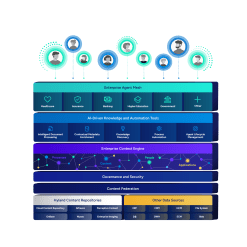Developing an ECM strategy
A content blueprint is key before upgrading to a new ECM platform or modernizing your existing one.

Harness the power of a unified content, process and application intelligence platform to unlock the value of enterprise content.
Learn more
Automate your document-centric processes with AI-powered document capture, separation, classification, extraction and enrichment.
Learn about Hyland IDPIt's your unique digital evolution … but you don't have to face it alone. We understand the landscape of your industry and the unique needs of the people you serve.
 Overview of industries
Overview of industries
Countless teams and departments have transformed the way they work in accounting, HR, legal and more with Hyland solutions.
 Overview of departments
Overview of departments
We are committed to helping you maximize your technology investment so you can best serve your customers.
 Overview of services
Overview of services

Learn proven strategies, connect with experts, innovate boldly
Register for CommunityLIVE 2026 today
Our exclusive partner programs combine our strengths with yours to create better experiences through content services.
Overview of partners
Join The Shift newsletter for the latest strategies and expert tips from industry leaders. Discover actionable steps to stay innovative.
Register now
Hyland connects your content and systems so you can forge stronger connections with the people who matter most.
Learn about HylandWith our modern, open and cloud-native platforms, you can build strong connections and keep evolving.
 Dig deeper
Dig deeper
Reading time minutes
A content blueprint is key before upgrading to a new ECM platform or modernizing your existing one.

An enterprise content management (ECM) strategy is an organization’s approach to storing, centralizing, and sharing its documents and other assets. It includes the use of tools that enable the origination, creation, editing, management, review, publishing, search, retrieval and applied use of information regardless of the initial source or format.
An ECM strategy typically addresses:
The proliferation of information stored in disparate forms and locations — photos and videos on smartphones and connected devices, instant messages and emails on work PCs, spreadsheets and documents in the cloud, etc. — makes consolidation a necessary but challenging endeavor.
Related articles
Whether implementing an ECM system for the first time or upgrading to a new system, a knowledge-based organization needs a formal plan to ensure that program requirements are met and end users’ needs are addressed. An enterprise approach to content management should enable the streamlining of business processes, eliminating bottlenecks.
Ultimately, an ECM solution provides knowledge workers the information they need to make the best possible business decisions.
An enterprise information platform with ECM support solves issues of paper overload, unstructured information, and delays when trying to process, access, and store information.

Two breakthrough innovations radically expand the reality of what ECM means. With Hyland’s bold approach to weaving AI into your content universe, you can move faster than ever and realize incredible outcomes.

Analyst firm Deep Analysis uncovers the trends, challenges and opportunities shaping the future of AI and intelligent automation. Download the full report to unlock actionable insights that drive innovation and success in your organization.

Gain a cloud-native digital transformation strategy dedicated to better customer service — and smarter, stronger, faster growth. With Hyland, you can reach your full potential.
